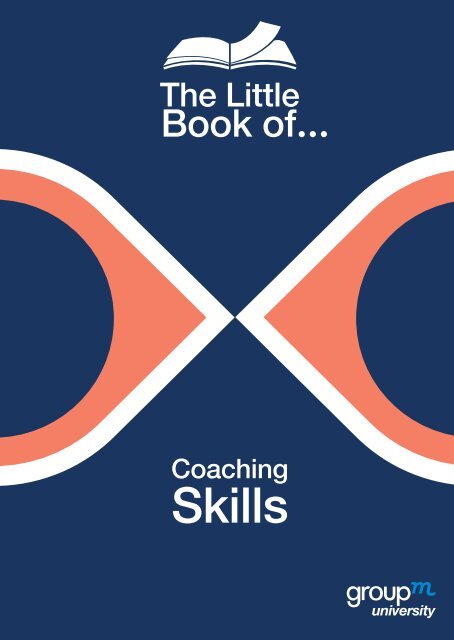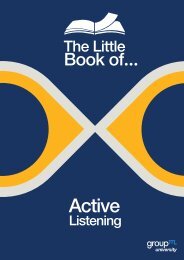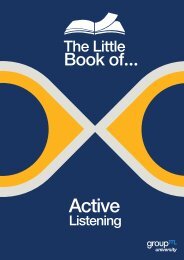LittleBookOf_Coaching
Create successful ePaper yourself
Turn your PDF publications into a flip-book with our unique Google optimized e-Paper software.
The Little<br />
Book of<br />
<strong>Coaching</strong><br />
Presentation<br />
Skills<br />
Skills
Contents<br />
03<br />
05<br />
11<br />
13<br />
17<br />
This booklet explores<br />
different types of coaching,<br />
key approaches, styles, and<br />
the kinds of questions to<br />
ask.<br />
What is coaching?<br />
Types of <strong>Coaching</strong><br />
Key Approaches<br />
<strong>Coaching</strong> Styles and<br />
Models<br />
<strong>Coaching</strong> Questions<br />
99%<br />
99% are satisfied with<br />
the overall experience of<br />
coaching.
Why coaching works<br />
<strong>Coaching</strong> is not new, it’s been around since the<br />
1800’s, derived mostly from sports coaching, but<br />
becoming more popular in a business<br />
context in the 1970s and 80s.<br />
<strong>Coaching</strong> has seen measurable results.<br />
Most formal, professional coaching is carried out<br />
by qualified people who work with clients to<br />
improve their effectiveness and performance, and<br />
help them achieve their full potential. However,<br />
managers and leaders in the organisation can be<br />
just as effective as externally hired coaches.<br />
Managers don’t have to be trained formally as<br />
coaches. As long as they stay within the scope of<br />
their skill set, and maintain a structured approach,<br />
they can add value, and help develop their<br />
people’s skills and abilities.<br />
Increased Productivity<br />
Professional coaching explicitly targets maximising<br />
potential and in doing this unlocks latent<br />
sources of productivity and effectiveness. At<br />
the heart of coaching is a creative and thought<br />
provoking process.<br />
Positive people<br />
In the face of uncertainty caused by workforce<br />
reductions and other factors, expectations remain<br />
very high. Restoring self-confidence and self-trust<br />
to face the challenges is critical to meet<br />
organisational demands.<br />
Return on Investment<br />
The coach/client relatiosnhip generates learning<br />
and clarity for forward action with a commitment to<br />
clear measureable outcomes.<br />
6<br />
© GroupM University - 2018<br />
1<br />
© GroupM University - 2018
What exactly is coaching?<br />
<strong>Coaching</strong> is a useful way of developing people’s<br />
skills and abilities, and of boosting performance.<br />
It can also help deal with issues and challenges<br />
before they become major problems.<br />
A conversation between the coach and the<br />
coachee focuses on helping the coachee<br />
discover answers for themselves.<br />
Coaches in the workplace are not<br />
counselors, psychotherapists,<br />
gurus, teachers, trainers, or<br />
consultants – though they<br />
may use some of the same<br />
skills and tools.<br />
<strong>Coaching</strong> is considered to be a positive and<br />
proven approach for helping others explore their<br />
goals and ambitions, and then achieve them.<br />
2 3<br />
© GroupM University - 2018<br />
© GroupM University - 2018
How many types<br />
of coaching do<br />
you know of?<br />
Performance<br />
<strong>Coaching</strong> activities here are aimed at<br />
enhancing an individual’s performance in their<br />
current role at work, to increase their<br />
effectiveness and productivity at work.<br />
Generally, performance coaching derives its<br />
theoretical underpinnings and models from<br />
business and sports psychology as well as<br />
general psychological theory.<br />
Skills<br />
This form of coaching focuses on the core<br />
skills an employee needs to perform in their<br />
role. Skills coaching provides a flexible,<br />
adaptive, ‘just-in-time’ approach to skills<br />
development.<br />
<strong>Coaching</strong> programmes are tailored<br />
specifically to the individual and are<br />
generally focused on achieving a number of<br />
skill development objectives that are linked to<br />
the needs of the organisation.<br />
4<br />
© GroupM University - 2018<br />
5<br />
© GroupM University - 2018
Career<br />
<strong>Coaching</strong> activities focus on the individual’s<br />
career concerns, with the coach eliciting and<br />
using feedback on the individual’s capabilities<br />
as part of a discussion of career options.<br />
Executive<br />
One to one performance coaching is<br />
increasingly being recognised as the way for<br />
organisations and individuals to improve<br />
performance.<br />
The process should lead to increased clarity,<br />
personal change and forward action.<br />
By improving the performance of the most<br />
influential people within the organisation, the<br />
theory goes that business results should<br />
improve.<br />
Personal / Life<br />
This form of coaching provides support to<br />
individuals wishing to make some form of<br />
significant changes happen within their lives.<br />
Coaches help individuals to explore what they<br />
want in life and how they might achieve their<br />
aspirations and fulfil their needs. Personal/life<br />
coaching generally takes the individual’s<br />
agenda as its start point.<br />
Executive coaching is often delivered by<br />
coaches operating from outside the<br />
organisation whose services are requested for<br />
an agreed duration or number of coaching<br />
sessions.<br />
6<br />
7<br />
© GroupM University - 2018<br />
© GroupM University - 2018
<strong>Coaching</strong> is not mentoring, nor is it counselling.<br />
Mentoring is a long term relationship based on<br />
offering life experience, knowledge, skills and<br />
advice.<br />
Six Golden Rules of <strong>Coaching</strong><br />
Confidentiality and Trust<br />
Counselling is helping someone deal with<br />
something from the past (and should always be<br />
dealt with by a qualified professional).<br />
<strong>Coaching</strong> is about where you are now and where<br />
you want to be. You cannot coach someone who<br />
is being counselled as they can’t move forward<br />
until they have dealt with or accepted the past.<br />
The Solution Lies Within<br />
No Judgement or Fixed Agenda<br />
Focus on the Whole Person<br />
You are Equal Partners<br />
Look to the Future and Next Actions<br />
8<br />
© GroupM University - 2018<br />
9<br />
© GroupM University - 2018
Key approaches<br />
used in<br />
coaching<br />
Structured <strong>Coaching</strong><br />
Most coaching is achieved by asking the right<br />
questions – the types of questions that coachees<br />
would ask of themselves.<br />
Active Listening<br />
Listen actively so that you pay attention to the<br />
fine detail of what coachees are saying, and how<br />
they’re saying it.<br />
Summarising and Repeating<br />
During a coaching session, summarize where the<br />
coaching conversation, or part of the conversation,<br />
has led.<br />
Checking in with the Coachee<br />
10<br />
© GroupM University - 2018<br />
During a coaching session, it really helps to<br />
confirm with coachees that the session is going<br />
well for them and that it’s covering what they want<br />
it to cover.<br />
11<br />
© GroupM University - 2018
<strong>Coaching</strong> styles<br />
and models<br />
<strong>Coaching</strong> models and styles because this is very<br />
subjective. It’s good to be aware of your preferred<br />
default style, so that you can flex if needed as well<br />
as knowing the different types of coaching model.<br />
Oskar / Getting results by focusing on solutions.<br />
O utcome<br />
S cale<br />
K now-how<br />
A ffirm and action<br />
R eview<br />
Positive: Getting people excited about their goals.<br />
P urpose<br />
O bservations,<br />
S MART,<br />
I nsight<br />
T eam<br />
I nitiate<br />
V alue<br />
E ncourage<br />
12<br />
© GroupM University - 2018<br />
13<br />
© GroupM University - 2018
Practice: Finding the best solution to specific<br />
problems.<br />
P roblem<br />
R ealistic<br />
A lternative<br />
C onsider<br />
T arget<br />
C hosen<br />
E valuate.<br />
A good coach will make<br />
people see what they<br />
can be, rather than what<br />
they are.<br />
Grow: a simple process that brings structure to<br />
coaching.<br />
G oal<br />
R eality<br />
O ptions/obstacles<br />
W ill/way forward<br />
14<br />
© GroupM University - 2018<br />
15<br />
© GroupM University - 2018
Good coaching questions<br />
(and some not so good)<br />
Tip / Ask open questions. Why questions can also<br />
create defensiveness. You always want to maintain<br />
rapport with your clients and an atmosphere of safety<br />
and trust.<br />
So when you feel the urge to ask a why question, see if<br />
you can rephrase it to What is it about…..<br />
“Why are you upset about this?” Rephrase to: “What<br />
is it about this situation that upsets you or you find<br />
upsetting?<br />
?<br />
?<br />
?<br />
16<br />
© GroupM University - 2018<br />
Confusion ways to question<br />
Stacking<br />
Do you sometimes have so many questions to ask<br />
you just don’t know which one to ask first and so<br />
you decide to ask them all…. one after the other?<br />
Ask one question, let that question be heard<br />
and processed. It is important for you to be<br />
comfortable with silence and pause to allow your<br />
client to be with the question and allow their<br />
brilliance to shine.<br />
Convoluted<br />
Questions like: “How do you know that you are<br />
not a good writer because I heard you say that you<br />
have written lots of good articles and you know<br />
that writing articles is not one of your strengths but<br />
you did it, so what else might it be telling you about<br />
your ability to write well or even if you are a good<br />
writer and what if you could write well, what would<br />
you do differently?” - “huh?”<br />
17<br />
© GroupM University - 2018
Rhetorical<br />
Are rhetorical questions the kind of questions<br />
you ask but don’t really want an answer? When<br />
you feel the urge for a rhetorical question coming<br />
on… STOP! Take a step back and self-manage<br />
your interpretation of the issue.<br />
Leading<br />
As a coach, you trust that your clients have the<br />
answer but how many times do you have the<br />
urge to just tell them what to do? Instead, you<br />
might just ask a question that might lead them<br />
to what you have in mind.<br />
Really trust that the client knows what to do and<br />
how to do it. Stay just with what the client is saying<br />
and ask your questions from there. Trust the<br />
coaching process and resist the urge to lead them<br />
in a certain direction.<br />
Close question<br />
Close-ended questions are limited and access only<br />
the left side of the brain to elicit a yes or no answer.<br />
To be brilliant at what you do, your questions have<br />
to be open-ended, empowering, powerful and<br />
thought provoking questions that probe, inspire,<br />
motivate and create greater self-awareness.<br />
It’s still a question, right? Yes, but not a very<br />
empowering one. Leading questions are just a<br />
clever way to direct the client’s thinking or<br />
perspective on an issue in the way that you<br />
think they should consider. The client hasn’t<br />
referenced it himself and you think it is just what<br />
he needs to do.<br />
18<br />
© GroupM University - 2018<br />
19<br />
© GroupM University - 2018
Remember!<br />
The key elements in this booklet may seem<br />
a little focused on ‘formal’ coaching, but the<br />
principles behind it all are that as a manager,<br />
adopting a coaching style with all your team<br />
will help you get the most out of them, as they<br />
will become used to finding the answers for<br />
themselves.<br />
20 21<br />
© GroupM University - 2018<br />
© GroupM University - 2018







